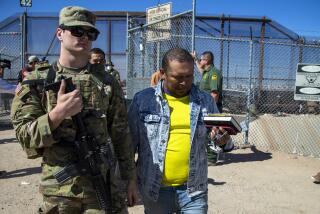No Afghan Pullout Delay, Soviets Say : Remaining 55,000 Troops to Be Gone by Feb. 15 Deadline, General Reaffirms
- Share via
MOSCOW — In a move to put an end to speculation about Soviet intentions, the Soviet military commander in Afghanistan said Sunday that he expects all of the Kremlin’s troops to be withdrawn from that country by mid-February.
“It is a delicate question which worries everybody in the world and, of course, it worries us,” Lt. Gen. Boris V. Gromov said. “But the plan and the scheme of the withdrawal have been drawn up.”
Gromov told Soviet television that the withdrawal of the remaining 55,000 Soviet troops in Afghanistan would be completed by Feb. 15, the date specified in an accord reached in Geneva last April. The agreement was signed by Afghanistan, Pakistan, the Soviet Union and the United States, the latter two as guarantors.
Gorbachev Was Silent
In November, the Soviets announced that they were suspending their troop withdrawal because of the worsening military situation in Afghanistan, and they blamed increased rebel attacks and U.S. arms shipments to the insurgents. Since then, the Kremlin had refused to confirm the withdrawal date, and Soviet President Mikhail S. Gorbachev omitted any mention of the February commitment during his speech to the United Nations in December.
Concern over the deadline mounted after the breakdown of peace talks between Soviet officials and Afghan resistance groups based in Pakistan. The rebels said they would not meet again with the Soviets if the latter continued to insist on a role for the current Soviet-backed regime in Kabul in any future Afghan government.
After the talks broke down, Yuli M. Vorontsov, the Kremlin’s trouble-shooter on Afghan matters, said there was a danger that the Soviet Union would not be able to meet its obligations under the Geneva accord.
Returning to Moscow last Tuesday after a tour of Afghanistan and the region, Vorontsov warned that the Feb. 15 pullout deadline was in jeopardy because of continued rebel attacks on Afghan government forces and the unresolved issue of a political settlement.
Soviet Foreign Minister Eduard A. Shevardnadze, who paid an unexpected visit to Kabul over the weekend, ended his trip by issuing a statement pledging to the Kabul government that the Soviets will “not leave it in need.”
A Tass news agency report on Shevardnadze’s visit noted that Afghan rebel groups are planning an economic blockade of the capital and that “a shortage of food and fuel is felt in Kabul already now, and the situation is being aggravated by winter cold.”
No Interference Allowed
Speaking in an interview with the Afghan press agency, Shevardnadze was quoted as saying that the Soviets will not permit the rebels to interfere with Moscow’s obligations to supply the Kabul government “despite all obstacles.”
“If a war is imposed on the Afghan government despite the common sense and logic of national interests, (the Soviet Union) will be forced to counter this with a force of arms, and it has this force,” Shevardnadze told the official Bakhtar news agency. “The present regime has every opportunity to withstand, and in case the war goes on, the Soviet arms supplies will also be continued.”
Shevardnadze appeared to be lashing out at the United States and Pakistan, which have supported the rebels, when he complained in the interview that the people “who harangue most of all for the withdrawal of Soviet troops” now appear to be trying to prevent the pullback in order to justify their assistance to the rebels.
Shevardnadze and the Afghan government of President Najibullah expressed hope that the rebels would agree to terms for a peace settlement that would allow the participation of all the parties to the conflict in a future government.
In a related development, Foreign Minister Ali Akbar Velayati of Iran said that talks between the Soviet Union and the moujahedeen rebels are a positive development and should be continued.
“It is proper for the leaders of the Soviet Union to show their good faith and accept the will of the Afghan nation in choosing their real representatives,” Velayati told a conference of rebel leaders in Tehran.
The Soviets have so far withdrawn about 50,000 troops from Afghanistan and are expected to pull out the remaining 55,000 between now and the deadline. Western diplomats in Kabul have reported a sharp increase in the number of military transports leaving the capital at night, as well as the closure of the Soviet military hospital in Kabul.
The Soviet Union invaded the country in 1979 and had as many as 115,000 troops there at the height of its involvement. The lengthy conflict was a huge drain on Soviet economic resources, however, and mounting casualties provoked growing opposition at home.
More to Read
Sign up for Essential California
The most important California stories and recommendations in your inbox every morning.
You may occasionally receive promotional content from the Los Angeles Times.












